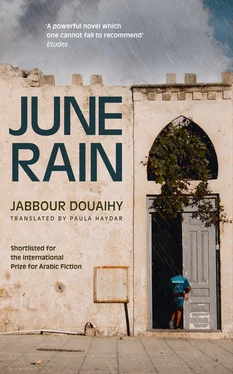We passed the last of the scattered buildings along both sides of Al-Arz Street and made a turn at the water storage tank. Now that we were on a flat road and the driving had become easier, the time had come for him to start telling us why he was taking us home on a Monday. But just as soon as the high mountains, still wrapped in a light morning fog, appeared, we heard his sobs. We suddenly realised that he was not going to talk, and so we stopped asking questions and began watching him in the rear-view mirror, usually his means for supervising us. His big green eyes were the colour of apples, the kind my grandfather wouldn’t let us pick, always telling us that they hadn’t ripened yet.
The plain leading to our village unfolded before us while Maurice wept. Those of us who were seated by the windows poked our heads out to catch the breeze and enjoy the view of the olive trees as they receded behind us, back towards the city, breaking the monotony of the plain. As the plain stretched before us, we looked around and counted each other. There were eighteen of us in various grades, but not all were from Barqa. Two strangers had slipped into the fold. Actually, their parents lived in our town, but they were still strangers. Jamil al-Raasi didn’t differentiate them from us. They lived in Barqa, but they were not Barqa kids. They chose to ride with us and risk facing whatever dangers were in store for us, rather than sit at those gloomy desks at school.
Maurice wept as if he were all by himself and not being watched by all our eyes, as if it were between him and himself alone. Our neighbour, Maurice. He hadn’t been blessed with children of his own. I used to see him after he dropped everyone off, sitting beside his wife on a wooden bench under a jujube tree, as if waiting for evening to fall, a small radio at their side blaring Mohammed Abd al-Wahhab songs. Maurice was the first person I ever saw cry with total abandon, never wiping his tears, letting them pour down his cheeks and drip onto the steering wheel. That kind of weeping only happened in romantic movies like the ones the older schoolchildren often skipped school to go and see at the Roxy Theatre. Maurice’s green eyes looked very big in the wide mirror. While he wept, we watched in total silence, discovering for the first time all the rumbling and hissing sounds that were usually muffled by our constant yelling as we rode in Maurice’s tottering bus.
The only thing that drew our attention away from Maurice was arriving at the steep mountain pass where the houses of the town, clumped together on top of the hill and still engulfed in the white fog rising from the river, came into view. After slowing a little before the final stretch, he drove us down with the brakes screeching until we could see the steel bridge and the crowd that had gathered around an army tank; a soldier wearing a helmet painted with camouflage colours peered out of the turret. There were only women and soldiers. I saw my aunt standing among them. She was wearing a red dress and her hair was dishevelled. Most of the women were dressed in black. I didn’t know why they had sent my aunt rather than someone else to pick me up. I assumed my mother and father were occupied with whatever was happening. I saw her from a distance, angrily shrugging her shoulders with her arms folded across her chest. There were around twenty women huddled together and a small band of soldiers scattered on and around the bridge. When we got off the bus, we heard one of the soldiers telling another, with their rifles strapped to their shoulders as they looked at the muddy water, how the snows had been late to thaw the year before and how the river had flooded, sweeping the stone bridge away, so a steel bridge had been built in its place. I tried to ask my aunt what was happening, but she shut me up. She put her hand on my mouth as if I had committed a crime. The women took off on foot, accompanying the schoolchildren to the town. It was a strange procession. My aunt took me by the hand and led me along. I remember I kept looking back, wondering what some of my schoolmates were going to do. They were still standing there waiting with the soldiers because no one had come to get them. No one had come for the two strangers. Perhaps their parents hadn’t expected their sudden arrival. I don’t know why I was worried about them, since, being strangers, they were not in any danger.
Strangers, al-ghirb in Arabic or al-ghurb in some dialects, is the plural of al-ghareeb , stranger. It stems from the word al-gharb with an ‘ a ’ meaning ‘the West’, the direction from where those who are not from among us — the outsiders — come. We often went on about that — with or without any prompting — saying that nothing pleasing to the heart ever came from them. Those intruders made their foreignness obvious the moment they opened their mouths. A stranger’s accent exposed him immediately, and was usually quite humorous. We found it strange when one of us, a cousin or neighbour, adopted one of those accents after spending a year or two at a school near the capital city. Their accent made them sound more like a Beiruti or someone from Kisrwan. Those were accents we couldn’t stand. We would try to imitate them and make fun of people who talked that way, adding ‘sh’ to the ends of words or pronouncing the letter ‘ qaaf ’ like the people from the Chouf region, who pronounced these words as they do in formal Arabic, rather than as a glottal stop as we do. It was as though these comical idiosyncrasies made the people who articulated them seem so stupid and idiotic we couldn’t bear it. If they came back at us, making fun of our own accent known for its preponderance of ‘u’ vowels — as for example when we pronounce the word for ‘my brother’ we say khayy-u instead of khayy-i and bayy-u instead of bayy-i for ‘my father’ — we would say we inherited this from Syriac, which we sometimes claimed was our original language and that there was no shame in that. Rather, it was a source of pride and a testimony to our deep-rootedness. We could also detect a stranger by the food he ate. ‘Strangers’ food’ was well-known, and strangers were easily discovered by the way they made their kibbeh ; it always came out too thick so they’d have to add a lot of spices to make it taste better. There were other dishes we heard about, like arnabiyyeh and ablama , and so forth, but these never graced our dinner tables. And strangers did not get counted. For example, when certain events resulted in people getting killed and wounded, the strangers among them were neither mentioned by name nor counted among the casualties. And when there was a fatal accident or car crash, the best way to set everyone’s minds at ease was to say that the victim was ‘a stranger’. All the commotion and interest in the incident would suddenly come to a halt and everyone would go about their business as before. Also, if a man married a woman from outside the town, she remained nameless, ‘a stranger’. In general, that was not advisable, because such a woman would be a heavy burden on the husband since only a girl from his own village would know how to put up with him. ‘Strangeness’ was not measured in kilometres but rather in hundreds of metres outside the village, starting at the very first village which overlapped our own orchards. As for how long it took to become ‘naturalised’ there was no guaranteed timeframe. No one could be sure when people would stop whispering about a person and their family and referring to them as ‘strangers’. When we talked about Asaad Beyk bringing people from Akkar to build his house, for example, someone hearing this who wasn’t familiar with the history of that influx of labourers might think it took place yesterday. But a closer inspection of the biography of this eminent man, the son of that great family, would confirm that this influx happened before 1887, the year the house was constructed, when those strangers chiselled the stones and hoisted them into place.
Читать дальше












